Episodic Interview: Noel Murray and Emily St. James talk Lost's impact on TV Criticism [Part Two]
I mean, I also talk a lot, so calling this an interview is maybe misleading but ¯\_(ツ)_/¯
In part one of our conversation inspired by their book Lost: Back to the Island, which hit shelves this week, Noel Murray and Emily St. James reflected on their early experiences writing about Lost as it aired, beginning to consider how television criticism as a whole was shaped by that process.
In part two, we dive further into the ways contemporary criticism has evolved since our years writing about Lost, whether for better or for worse.
As before, this has been edited for length and clarity, and if Emily or Noel say I cut their most insightful asides, no one can argue otherwise. To be alerted when part three goes live, become a free subscribers.
Myles McNutt: In part one, I reflected on the idea that the modes of criticism Lost helped inspire don’t always benefit shows that aren’t built exactly like Lost, and I really do think Yellowjackets is the perfect example. I talked about season one before in terms of the fans, but season two was a great example of a show veering in a direction that split critics down the middle and sparked a lot of “backlash” within critical communities. I personally shared a lot of those criticisms (often in the comments on Ben Rosenstock’s reviews here at Episodic Medium), but whereas this used to be a process done in dialogue with other critics, it does seem like the subsequent 15 years since Lost ended have enshrined a certain kind of critical writing that creates tension which seems counterproductive to meaningful conversation with one’s readers.
Emily St. James: I think there's some truth to that. First of all, I have to say that Yellowjackets season two is brilliant and has nothing wrong in it. [Laughter] Okay, but seriously: when I got the job writing on season three, I had sold a piece that was like going to argue that, and then I wrote them back saying “I can't write this for the weirdest reason.” But in terms of the criticism, I think we’ve gotten a little too wise to how the machinery works. To step out of TV entirely, we are too aware of how Taylor Swift operates in the world, and that makes it impossible to approach an album she releases and just be like “this is good, this is mediocre, this is bad.” Now we have to account for other questions: Who are the various people she's writing about? What is the status of her wealth? How many times is she flying her jet? All of these things are worth knowing, I guess, but I don’t know how much they inform my immediate emotional response to the work.
Look at Deadpool and Wolverine, which was a huge hit this summer, and was basically an adaptation of a making of Deadpool and Wolverine article, talking about all the I.P. rights issues they’ve had to fight with. Why is this in a movie? Why is this part of the story? I’m someone who loves that shit and even I’m a little burnt out on it. So I do think there is this thing where anytime you watch a TV show, especially one with a genre bent, you have a set of expectations: here’s the beats the story can hit, here's what happens in this moment, etc. And you have too much of a sense of all the things that can happen, and it’s impossible to subvert that.
The creative community has definitely pushed back on this, with Lindelof’s work on The Leftovers the best example. He went in saying “there’s not going to be an answer. I cannot answer this question. You don’t get an answer.” And in the finale there’s a possible answer, but he never says if it’s true. And there are some people who were infuriated by this, but on the creative side there is a general sense that if you pose huge questions, there’s never going to be a satisfying answer. If you explain away a mysterious island by suggesting it’s built over a crashed UFO, that makes it less special, not better. It makes for a less interesting place to tell stories. But there’s also this expectation in the audience that there will be answers, and when you don’t give one it denies them the closure they were seeking in fiction that is unattainable to them in reality.
I think about this a lot in my current professional trajectory, but I also just think about it as a critic and writer and person who loves watching long form stories like Lost. How do you account for the fact that life doesn’t offer you answers? I think art should reflect that reality, and Lost taught us that impulses to the contrary haven’t always been helpful as a TV watching community. It also doesn’t help that pay cable and streaming have taken long-form storytelling in two completely different directions—a Ryan Murphy show amps everything up and you get all the plot developments of six seasons in six episodes, whereas a streaming drama stretches things out and you get one episode across an eight-episode season. Those twin impulses have perhaps further contributed to people forgetting how TV stories used to be told.
Noel Murray: I also have to wonder if one of the lessons learned from Lost and from Lindelof and Cuse was maybe don’t be so interactive with the fans—that it would be better to not be present and trying to explain yourself. They very purposefully after the finale said “We’re going to step away from this,” and then they really haven’t come back to talk about the show much after. Some of that might have to do with being stung by the reaction to the finale, but it’s also that the level of interaction we had back in the days of Television Without Pity and then blogs and Twitter. People like Shawn Ryan and Kurt Sutter, or even Shonda Rhomes on Twitter—I think fans got a certain idea in their heads that maybe they were there to listen to them, and they could steer the shows as fans (or critics), which is terrible. That's a horrible impulse or idea to have, that your reactions to a show can affect what they're putting on the screen.
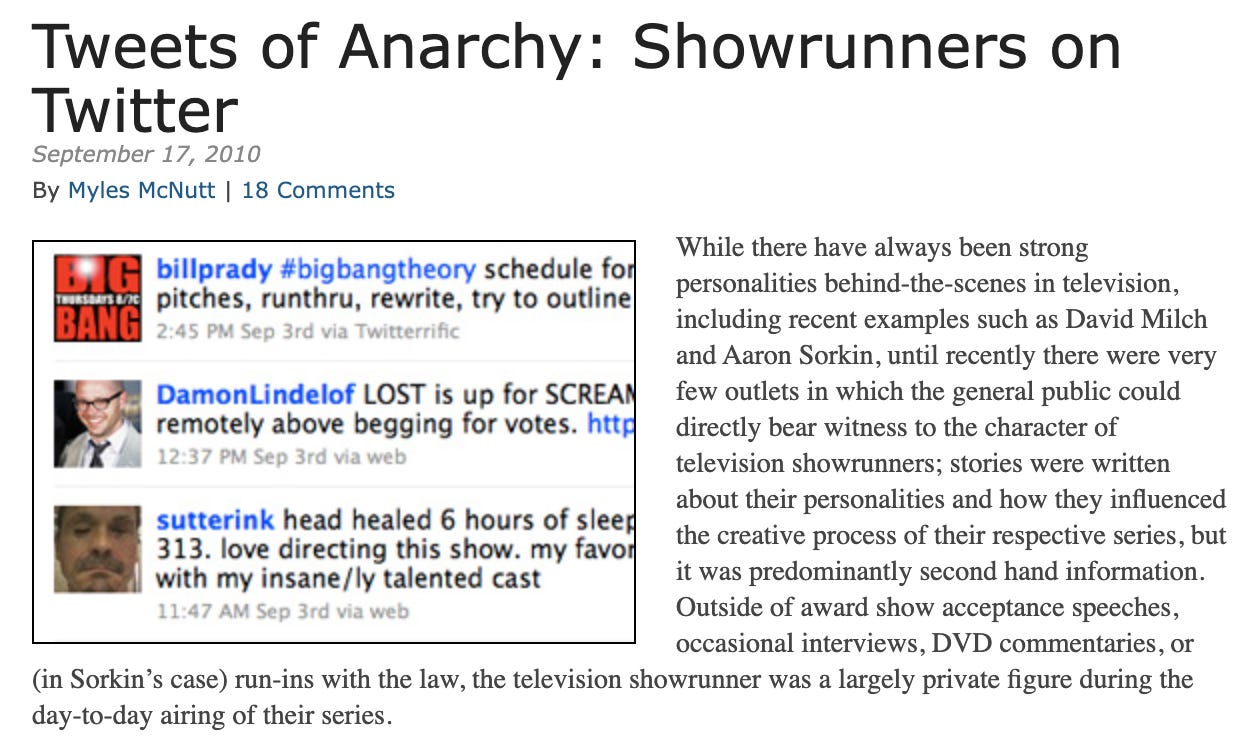
The disconnect between what fans and critics want and what a creator wants to create is very real, and I’m sure that there are always points of frustration when those ideas don’t line up. But I also think that sometimes they just don’t understand the criticism—Game of Thrones was a perfect example of that, where there was lots of well thought-out criticism of the sexual violence on the show and it felt like the creative team shrugged it off when they were asked about it.1 This seems paradoxical, that creators should be more attuned to fan criticism and also ignore it, but there also needs to be a line in the sand where creatives don’t feel beholden to the potentially debilitating discourses around their show. They should just do their own thing and let us react to it, without the interaction we maybe expected at the time Lost concluded.
MM: The issue of sexual violence—or really any ideological issues—raises the question of what kind of criticism was “acceptable” when writing weekly reviews of a show. I'm currently in the process of building a course to teach students how to write media criticism, modeling different methodologies from academic circles and how they apply in these cases. And in reflecting back, the truth is that when we were writing about Lost we really weren’t engaged in that type of ideological critique. It wasn’t what readers wanted, and it didn’t feel like it meshed with the plot summary/theorizing sides of the job. And while online criticism did eventually—rightfully—shift more into that lens when analyzing TV content, there was some tension where the parasocial dynamics of writing about a show weekly would be disrupted by more substantive critique of a show in a space still largely imagined as a “fan” space. And I think a lot of smart people were making compelling arguments but struggling with how to do so in a format that wasn’t built for it, and rightfully becoming frustrated at the backlash they were facing.
ESJ: I was just about to bring that up. I wrote an essay on race in the show (which you can find on Inverse) for the book, and I talked to a bunch of fans of color of the show, including Travis Bruggeman. He had these issues with the show that are now very de rigeur to talk about—"I love Lost,” we say, “but there’s a but that it always had trouble with stories about race and gender.” And we now know there were problems behind the scenes that point to that, but it was also how a lot of stories were told at that time on television. Travis was bringing this up at the time, but people were not interested in hearing it, even in comment sections and forums.
One of the problems was that, if a character wasn’t contributing to the mystery box of the show, the fans wouldn’t respond to them on a weekly basis. And so many of the characters who are not intrinsically tied to the mystery box were characters or color or women. So it became a thing that characters like Sun and Jin who are wonderful and have amazing episodes also just have nothing to do with the central mystery—one week they’d have this beautiful love story, and the next week they’re barely involved. That’s something I noticed clearly rewatching the show for the book, but at the time we were so focused on solving those mysteries that were tied up in Jack, Locke, Sawyer, and Kate. And while non-white characters like Hurley and Sayid occasionally got to be involved, once their piece of the puzzle was done they’d go back to their corners of the story.
The Game of Thrones era of criticism is where this type of ideological critique really enters all of these spaces—film criticism, too. But some of the discourse that came with that emerged in places like Tumblr where the critiques were maybe not an in-depth reading of the context involved, which exacerbated some of the tensions evident in Travis’ experience. I think Lost is in a weird era where there’s a growing awareness of these problems, but largely from people who are not being listened to. And then in the Game of Thrones era, more of those people have the microphone, but those points of view aren’t always easily integrated. And then you also have the TV Tropes thing, where identifying something as a trope became bad, which is not always the case—but that’s a whole separate discussion.
MM: One of the issues I’ve seen emerge in contemporary criticism is just how challenging it can be to mount serious ideological critiques while still doing what an episodic review demands of you. We know that we can’t look at TV without considering it through the lenses of race, gender, and sexuality in a changing social and cultural climate. It would be a disservice to ignore these things. But the “service” of these reviews is still often “recapping the plot for people who were confused” or “recounting events for people who want to dig deeper,” and there’s just a fundamental lack of compatibility there. I remember reading reviews of shows we were covering early on at Episodic Medium that were being written at The A.V. Club after we all left, and watching as writers would make good points about ideological issues but they’d do it after multiple paragraphs of thesis-free plot summary, and then dive back into summary thereafter. When you do that, it feels like the Tumblr drive-bys you mention Emily—a quick jab at an issue, but done in such a way that it lacks the evidence and structure to withstand knee-jerk rejections of “woke” discourse.
In order for ideological criticism to function on a week-to-week basis, you have to abandon the formal structures that Lost helped establish, demonstrating to your reader that what you’re observing has broken the bounds of a simple weekly dialogue about the show. The ritual function of episodic criticism is incredibly powerful, but it’s also resistant to change, and to disruption in the form of meaningful critique. And because this is a medium born out of fan communities like Lost, when we did start to dig deeper into how those shows are flawed or problematic, we learned quickly that we couldn’t just do so casually. It requires a lot of evidence, and is admittedly much easier when you’re a white dude with a media studies degree instead of a woman or a personal of color whose criticisms can be more easily—and wrongly—dismissed as personal grievances. Fans will push back against any critique of a show, to some level, which is why you need to pull yourself out of the formula to say “look, this needs to be addressed, and we’ll interrupt your regularly scheduled recap to do so”—well, provided you’re writing in a space where you have the flexibility to do so (which you modeled at The A.V. Club, Emily, and which I try to emulate at Episodic Medium).
NM: I wanted to tie back to something that Emily was saying in part one, too, because it is tricky. You're writing about something on a week to week basis, and you're writing for people who are watching the show, and they're watching the show because they like the show (unless they’re hatewatching), and so they want to read something that to some extent reflects their feelings about the show, which is positive. It’s a difficult relationship to have with your readers, and like Emily I’m somebody who tries to give a little bit of a wide berth. I try to give shows the benefit of the doubt. I try to meet what it’s doing on its own level, and reserve judgment in case it’s going to pay off two episodes from now. I learned this from Lost, I think—there were moments where we had no idea where they were going, and where even the writers didn’t know where they were going (Hurley’s van), and they end up paying off years later. But when you’re writing week-to-week, you want to enjoy it and share what you liked about it with readers who are probably enjoying it more than an average critic. But sometimes you can’t, and you have to say it isn’t working, and that you’re betrayed by what you’re seeing on screen. Myles, you’re right that it becomes hard to switch from “hey, let’s gather once a week and talk about this show we love” to “gosh, this thing is going off the rails.”
ESJ: Here's another thing that sort of happens when you shift into “this is either problematic or entirely not working” mode: you lose a sense of the conversational just a little bit. And like, obviously, you are the person getting paid to write about the show, you should be able to step out of conversation mode to be like, “they don't know what to do with Kate, and so they just keep putting her in a love triangle, and it's a disservice to a character I really liked in season one.” But it’s hard to do that during also talking about theories, and discussing whatever it felt like the conversation would be about—in other words, what made people love recaps so much. But now, when you read recaps, it's largely gone from them. Now it's increasingly just: here's the straight “what happened.”
MM: Yeah, in the reviews I’m thinking of above, there’s no conversation—it was so striking to me when The A.V. Club replaced so many of their departing contributors with people who had zero interest in conversational dialogue, to the point they never even acknowledged the people they were replacing and the idea they were taking over an existing conversation. It’s why I make contributors write “Welcome to the conversation” strays in every first review of a show.
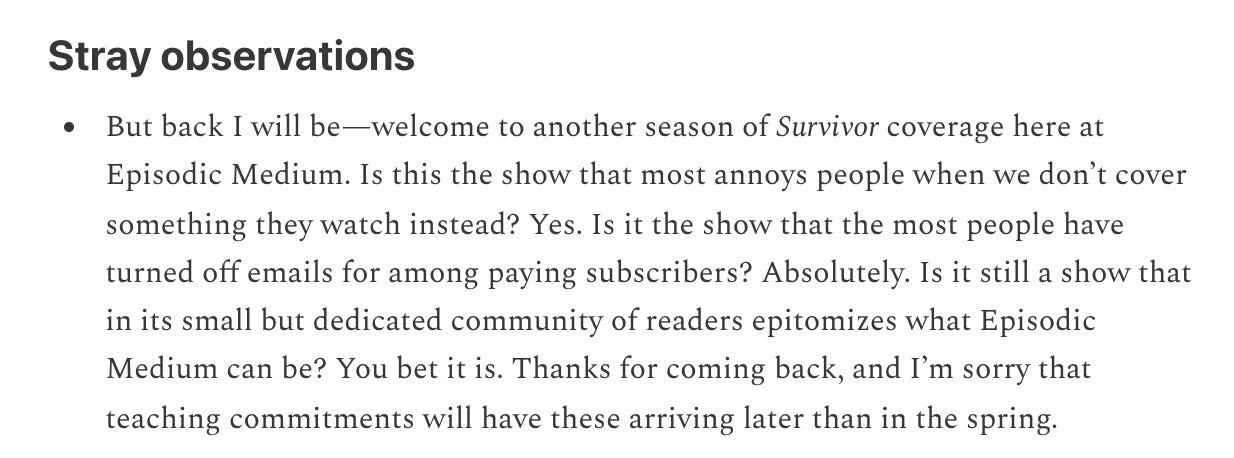
ESJ: And, admittedly, straight recap was how Television Without Pity operated. But they had tons of jokes. They were long, they were funny, and they were digressive. They’d be “okay, now we’ve got to get back to the plot.” And we've also kind of lost that now—it's just, here's some stuff, and also at the end I'm going to say I found this not great, and then there's going to be a version of stray observations. And there's nothing wrong with that. I have worked at enough websites to know that that is enormously popular and profitable, and that's what people want when they search for recap. However, toward the end of my time recapping shows regularly—I did a few at Vox—we sort of figured out a way around this problem. We turned every how into a different format. For Game of Thrones, we did something called “Winners and Losers.” You’d be like “This week Cersei won because she’s a badass bitch and I love her"—nothing to say about my gender there, huh? And then the next week “Arya lost because she got stabbed in the back.” But within those sections, you could do these larger things, and they’d be understood. They’d be confined to that one section, but they could inform the rest of what you’re talking about.
I felt this was a way to handle the problem, and you see it happening elsewhere—Vulture does a lot of power rankings, and they use those in a similar fashion. But there is still this need to present it in a way that still feels like you’re talking to a friend about the show, even though you would never be sit down and be like “This week on Succession, we learned about the dangers of capitalism…” But the structured recaps maintain that veneer, and that’s why I think that has some juice to it.
MM: First, I would absolutely do that with a friend. Second, this speaks to a tension that I’ve seen play out in the first couple of years of Episodic Medium. I’ll admit that I’m a firm believer that episodic reviews—not recaps—are evidence-based arguments designed to spark conversation in dialogue with readers’ own opinions. And that means that I’m resistant to efforts that try to either obfuscate or soften opinion in favor of a more service-driven, fan-oriented recap style (and forced William to abandon a perfectly cromulent one he planned to use for his Industry reviews).
But that absolutely creates tension when writers simply aren’t on the same wavelength as some commenters about a show, particularly ones with built-in fanbases. I’ve seen it with Star Wars, and I’ve seen it with Lord of the Rings—there’s people in the comments who are clearly fans and want something oriented to their level of investment, but we’re realistically covering these shows more as pieces of the larger TV ecosystem. I sympathize that they’re paying for a subscription to a site where they want the reviews to match their experience, but I also think the only way to avoid that issue is if writers strip any and all meaningful critique from their reviews and just recap the plot. The fact some hardcore fans might have different perspectives than someone without a full understanding of lore is something I sort of have to take as a feature instead of a bug, because the alternative is…no longer criticism.
Ideally, we’d have the budget to do experts/newbies dialogue on shows that draw this kind of discourse, but we don’t. And in the end, given that fan spaces are far more plentiful than critical spaces online, I’m always going to lean toward the latter. But it would all be less stressful if we were back in the age of Lost where it felt like you could find so many distinct2 opinions about a show—even if we might have all been forced to write in a certain mode, and thus not able to embrace the full critical potential of our writing, there were amateur and professional voices across a wide spectrum of experiences that readers could choose from. You’re kind enough to include me in your list of writers whose dialogue helped shaped your own, but I was only a college student at the time, while someone like Ryan McGee—who wrote about the site for Zap2it—was moonlighting from his day job. There was such a healthy discourse, and that’s just not the internet we live in today, which is why I get that some people know this is the kind of community they want to discuss TV with and get frustrated when the critic doesn’t like or write about the show in the way they think about it.
To be honest, part three is pretty much going to start with a direct continuation of this last conversation, but this was stretching the viable length of a newsletter as it was. And it ruined Emily’s “Ah, Zap2it, there’s a name I haven’t heard in a long time” joke, but I suppose you get the gist here. Anyway, to hear more about how we balance recap and analysis, and how Lost taught us how to be critics (for better or worse), come back for past three next week.
You can move onto Part Three below:
![Episodic Interview: Noel Murray and Emily St. James talk Lost's impact on TV Criticism [Part Three]](https://substackcdn.com/image/fetch/w_140,h_140,c_fill,f_auto,q_auto:good,fl_progressive:steep,g_auto/https%3A%2F%2Fsubstack-post-media.s3.amazonaws.com%2Fpublic%2Fimages%2Fab0c972e-f9f3-441a-8f36-e7a5450035ca_1746x1020.png)
Episodic Interview: Noel Murray and Emily St. James talk Lost's impact on TV Criticism [Part Three]
Myles here to note this was particularly egregious in the “Behind the Episode” features after the episodes that always existed in a vacuum from the critiques, and in their inanity often devalued the critiques by their omission.
I choose distinct over diverse here because, as ever, it was mostly white critics.

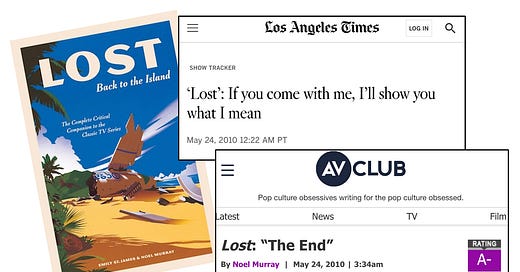



![Episodic Interview: Emily St. James & Noel Murray talk Lost's impact on TV criticism [Part One]](https://substackcdn.com/image/fetch/w_140,h_140,c_fill,f_auto,q_auto:good,fl_progressive:steep,g_auto/https%3A%2F%2Fsubstack-post-media.s3.amazonaws.com%2Fpublic%2Fimages%2Fe410a67a-0f0d-47ea-98ce-9949eae19dd7_1746x1020.png)
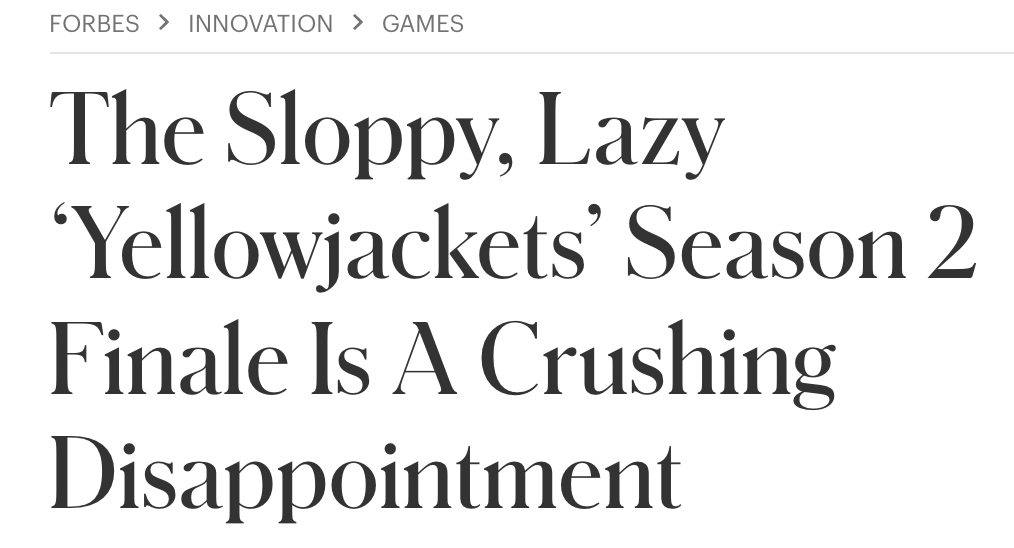
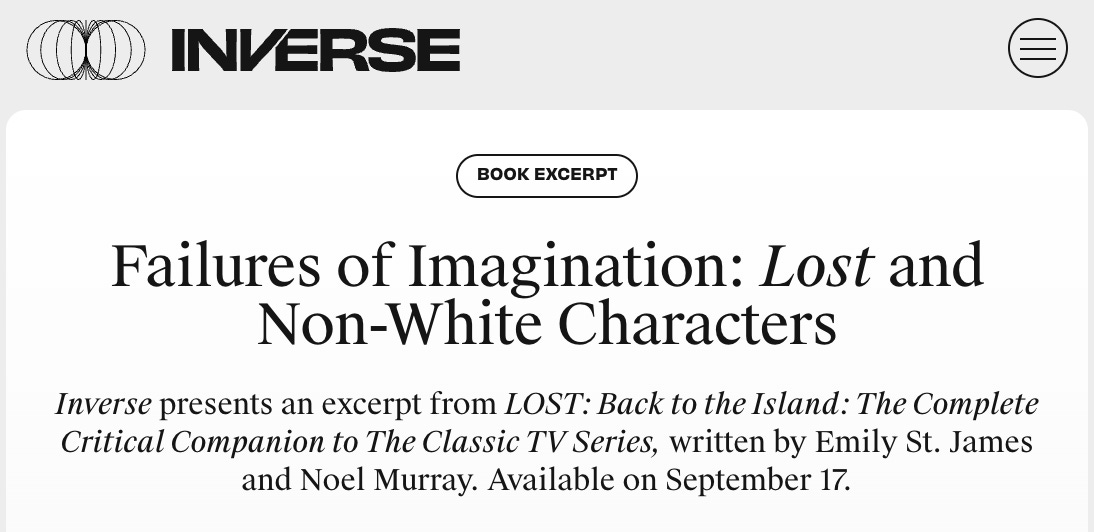
"I think about this a lot in my current professional trajectory, but I also just think about it as a critic and writer and person who loves watching long form stories like Lost. How do you account for the fact that life doesn’t offer you answers?"
The issue that I have with a show like LOST and Damon Lindelof in particular is that the idea that 'life doesn't give answers' can easily be used as an excuse to not actually deliver on narrative setups. I didn't mind that the show didn't always provide 'answers' for certain big questions or mysteries (lord knows, the Fine brothers video where they try to 'explain' everything with Hurley being in a mental hospital is a great example of just how bad the show would be if it tried catering to fan demand all the time) but it's also pretty evident that the writers would occasionally drop seemingly important plot threads or not deliver payoffs to narrative setups and then excuse the lack of resolution or instance of incoherence in the same way.
To put it another way, there is a difference between raising questions without giving definitive answers and failing to deliver resolutions to clear narrative setups and enigmas. It is the latter approach I found particularly egregious, as it would string the viewer along only to ultimately go nowhere. (Eg. the show sets up stories with and questions about a character only to then unceremoniously kill them off without having them do anything.)
It didn't help also that Lindelof really became over-reliant on what I call 'the art of timely interruption,' where one character is about to deliver a crucial piece of information to another only to get interrupted partway, which simply teases some sort of reveal but doesn't really deliver.
The whole recap thing has always seemed strange to me. When I look for criticism, it's because I want to read someone else's opinion and analysis, written in an engaging way - either a particular critic I like, or a 'brand' I trust like the old AV Club. The main reason I'm here is because Donna Bowman's coverage of Breaking Bad and Better Call Saul was an important part of my experience watching those shows. Whether it's that sort of in depth post-game analysis or more of a "should I watch this?" kind of review, the value I'm getting is the unique voice of the critic who wrote it.